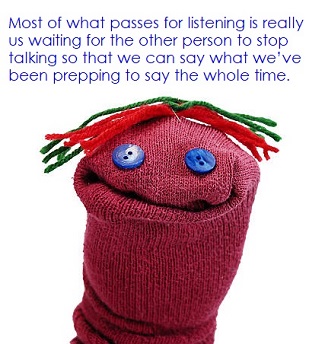This post is part of our Weekly Tips series.

I have yet to meet someone in a consultative role who doesn’t understand—and even extoll—the virtues of listening. I have also yet to meet someone who doesn’t have room to improve, including myself. Today’s tip features a four-point assessment to help you hone your listening skill.
The kind of listening that engenders deep trust and promotes real relationships is a kind of listening that requires that we pay very close attention. That’s where most of us fall down, because we all deal with ongoing, everyday interference. Like static on a radio station, this interference is sometimes loud and sometimes faint. But it’s pretty much always there.
Consider these four barriers to paying attention:
- A habit of talking. Most of what passes for listening is really us waiting for the other person to stop talking so that we can say what we’ve been formulating in our minds while they’ve been expressing themselves. In the meantime, the focus is on us, not on them, even though we pretend otherwise.
- Everyday distractions. Be honest: out of how many of the last ten conference calls you attended were you multi-tasking—checking email, sending instant messages, driving, sorting through stuff on your desk? Disruptions like these make it impossible to be truly present.
- The little internal voice. This is the constant companion that clogs your brain with incessant chatter. (If you think you don’t have a little internal voice, it’s the one that just piped up and said, “What little internal voice? I don’t have a little internal voice!”)
[Tweet “Four ways we all stink at listening: #getreal #communication”]Here’s a brief snippet from a typical internal dialogue:
Client: [says something work-related]
Your little voice: Uh oh. I should have spent more time preparing for this meeting. You know, I’m not sure I even like this guy.
Client: [says something work-related]
Your little voice: I do like his tie. And his suit.
Your little voice: Suit! Shoot! I forgot to drop off my laundry on the way in to work today!
(And so it goes …)
- A fear of intimacy. This is a juicy one. It’s the concern that if you really listen to someone in a way that they feel truly at ease with you … yikes! They might really open up.
The question isn’t whether you deal with these attention-derailers; the question is when and how.
Make It Real
This week, focus on the barrier to paying attention that plagues you the most, and experiment with ways to minimize it. Make one small change.
For example, if you have a habit of talking, employ a practice like counting to three or taking a deep breath before you interject in a conversation. If you succumb to everyday distractions, turn off all the alerts on your devices that pull your attention away from a conversation, or declare blocks of time in your calendar for uninterrupted work. If your little internal voice is a persistent interrupter, practice noticing it and bringing your attention back to the task or conversation at hand. If you have a fear of intimacy, practice being more empathetic in your interactions (I promise you will live to tell the tale).
Note what differences even small improvements make—for you and for your relationships.
Learn More

Read one of my all-time favorite articles, The Point of Listening is Not What You Hear but the Listening Itself, from our friends at Trusted Advisor Associates, or brush up on how to listen to build intimacy in Chapter 6 of The Trusted Advisor Fieldbook.
Andrea Howe
Latest posts by Andrea Howe (see all)
- A lesson from my own trust “fail” in my first-ever client meeting - April 15, 2024
- Why choosing silence in the face of awkwardness can be a trust tragedy - March 21, 2024
- What NOT to do when you think you’re being ghosted - February 21, 2024
